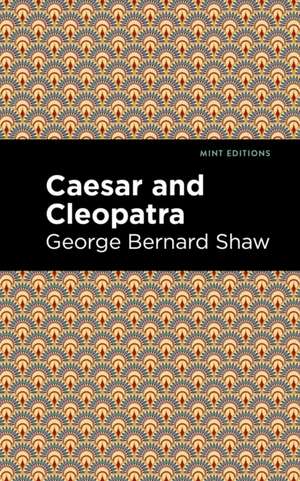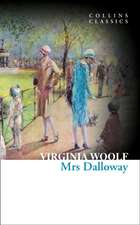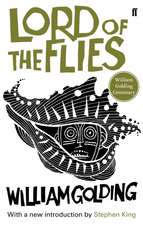Caesar and Cleopatra: Mint Editions
Autor George Bernard Shawen Limba Engleză Paperback – dec 2020
| Toate formatele și edițiile | Preț | Express |
|---|---|---|
| Paperback (9) | 38.60 lei 3-5 săpt. | |
| Mint Editions – dec 2020 | 38.60 lei 3-5 săpt. | |
| CREATESPACE – | 42.02 lei 3-5 săpt. | |
| – | 67.41 lei 3-5 săpt. | |
| CREATESPACE – | 70.31 lei 3-5 săpt. | |
| CREATESPACE – | 71.06 lei 3-5 săpt. | |
| CREATESPACE – | 74.53 lei 3-5 săpt. | |
| 1st World Publishing – 9 noi 2013 | 77.11 lei 6-8 săpt. | |
| Indoeuropeanpublishing.com – 16 iul 2019 | 98.32 lei 6-8 săpt. | |
| Sovereign – 19 aug 2018 | 125.70 lei 6-8 săpt. | |
| Hardback (3) | 61.59 lei 3-5 săpt. | |
| Mint Editions – 8 dec 2020 | 61.59 lei 3-5 săpt. | |
| 1st World Publishing – 9 noi 2013 | 173.00 lei 6-8 săpt. | |
| Indoeuropeanpublishing.com – 15 iul 2019 | 181.17 lei 6-8 săpt. |
Din seria Mint Editions
-
 Preț: 32.08 lei
Preț: 32.08 lei -
 Preț: 111.03 lei
Preț: 111.03 lei -
 Preț: 80.62 lei
Preț: 80.62 lei -
 Preț: 91.84 lei
Preț: 91.84 lei -
 Preț: 55.84 lei
Preț: 55.84 lei -
 Preț: 43.58 lei
Preț: 43.58 lei -
 Preț: 152.64 lei
Preț: 152.64 lei -
 Preț: 62.17 lei
Preț: 62.17 lei -
 Preț: 26.79 lei
Preț: 26.79 lei -
 Preț: 296.94 lei
Preț: 296.94 lei -
 Preț: 176.21 lei
Preț: 176.21 lei -
 Preț: 73.67 lei
Preț: 73.67 lei -
 Preț: 145.51 lei
Preț: 145.51 lei -
 Preț: 61.98 lei
Preț: 61.98 lei -
 Preț: 208.71 lei
Preț: 208.71 lei -
 Preț: 116.24 lei
Preț: 116.24 lei -
 Preț: 85.10 lei
Preț: 85.10 lei -
 Preț: 49.69 lei
Preț: 49.69 lei -
 Preț: 160.02 lei
Preț: 160.02 lei -
 Preț: 68.15 lei
Preț: 68.15 lei -
 Preț: 98.41 lei
Preț: 98.41 lei -
 Preț: 67.68 lei
Preț: 67.68 lei -
 Preț: 54.63 lei
Preț: 54.63 lei -
 Preț: 41.11 lei
Preț: 41.11 lei -
 Preț: 235.35 lei
Preț: 235.35 lei -
 Preț: 103.11 lei
Preț: 103.11 lei -
 Preț: 49.51 lei
Preț: 49.51 lei -
 Preț: 55.21 lei
Preț: 55.21 lei -
 Preț: 115.99 lei
Preț: 115.99 lei -
 Preț: 32.08 lei
Preț: 32.08 lei -
 Preț: 38.43 lei
Preț: 38.43 lei -
 Preț: 69.30 lei
Preț: 69.30 lei -
 Preț: 49.51 lei
Preț: 49.51 lei -
 Preț: 25.34 lei
Preț: 25.34 lei -
 Preț: 32.52 lei
Preț: 32.52 lei -
 Preț: 65.66 lei
Preț: 65.66 lei -
 Preț: 56.23 lei
Preț: 56.23 lei -
 Preț: 54.80 lei
Preț: 54.80 lei -
 Preț: 43.58 lei
Preț: 43.58 lei -
 Preț: 74.47 lei
Preț: 74.47 lei -
 Preț: 37.61 lei
Preț: 37.61 lei -
 Preț: 42.72 lei
Preț: 42.72 lei -
 Preț: 67.52 lei
Preț: 67.52 lei -
 Preț: 99.04 lei
Preț: 99.04 lei -
 Preț: 74.66 lei
Preț: 74.66 lei -
 Preț: 116.24 lei
Preț: 116.24 lei -
 Preț: 55.84 lei
Preț: 55.84 lei -
 Preț: 55.84 lei
Preț: 55.84 lei -
 Preț: 37.61 lei
Preț: 37.61 lei -
 Preț: 200.85 lei
Preț: 200.85 lei
Preț: 38.60 lei
Nou
Puncte Express: 58
Preț estimativ în valută:
7.39€ • 7.62$ • 6.19£
7.39€ • 7.62$ • 6.19£
Carte disponibilă
Livrare economică 03-17 februarie
Preluare comenzi: 021 569.72.76
Specificații
ISBN-13: 9781513268897
ISBN-10: 1513268899
Pagini: 108
Dimensiuni: 127 x 203 x 7 mm
Greutate: 0.13 kg
Editura: Mint Editions
Seria Mint Editions
ISBN-10: 1513268899
Pagini: 108
Dimensiuni: 127 x 203 x 7 mm
Greutate: 0.13 kg
Editura: Mint Editions
Seria Mint Editions
Notă biografică
Pygmalion is a play by George Bernard Shaw, named after a Greek mythological figure. It was first presented on stage to the public in 1913. In ancient Greek mythology, Pygmalion fell in love with one of his sculptures, which then came to life. The general idea of that myth was a popular subject for Victorian era English playwrights, including one of Shaw's influences, W. S. Gilbert, who wrote a successful play based on the story called Pygmalion and Galatea that was first presented in 1871. Shaw would also have been familiar with the burlesque version, Galatea, or Pygmalion Reversed. Shaw's play has been adapted numerous times, most notably as the musical My Fair Lady and its film version. Shaw mentioned that the character of Professor Henry Higgins was inspired by several British professors of phonetics: Alexander Melville Bell, Alexander J. Ellis, Tito Pagliardini, but above all, the cantankerous Henry Sweet.















